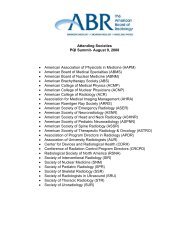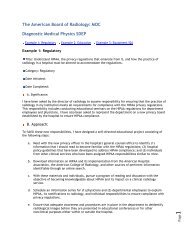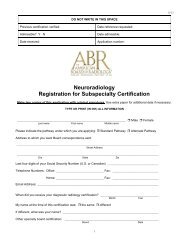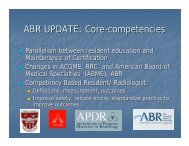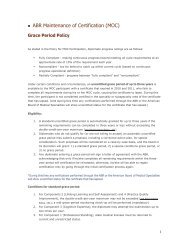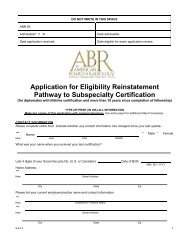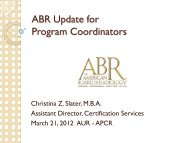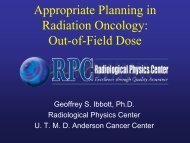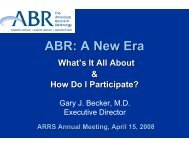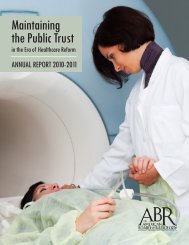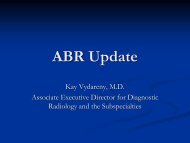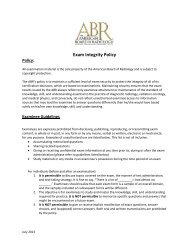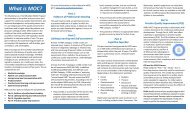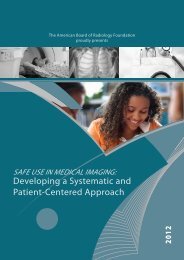EOF Core exam - Purpose - The American Board of Radiology
EOF Core exam - Purpose - The American Board of Radiology
EOF Core exam - Purpose - The American Board of Radiology
You also want an ePaper? Increase the reach of your titles
YUMPU automatically turns print PDFs into web optimized ePapers that Google loves.
ABR Update<br />
Kay H. Vydareny, M.D.<br />
Associate Executive Director <strong>of</strong> the<br />
ABR for Diagnostic <strong>Radiology</strong><br />
<strong>American</strong> Alliance <strong>of</strong> Academic Chief Residents in <strong>Radiology</strong><br />
(A 3 CR 2 ), Association <strong>of</strong> University Radiologists (AUR)<br />
Annual Meeting<br />
April 2013
Topics<br />
• Exam <strong>of</strong> the “now”<br />
• Exam <strong>of</strong> the “future” (ie October 2013)<br />
• IR-DR residency
June 2013 <strong>exam</strong><br />
• Last major <strong>exam</strong><br />
• Biggest yet given – complete <strong>exam</strong> + condition<br />
• No “pilot” <strong>exam</strong>s as in past few years
What will happen to the oral <strong>exam</strong><br />
• Nov 2013, May 2014, Nov 2014 – oral <strong>exam</strong>s<br />
(full and conditions)<br />
– If fail Nov 2014 – move to core<br />
– If condition Nov 2014 – move to certifying (2<br />
categories/conditioned category +essentials and<br />
NIS)<br />
• If fail, take entire certifying<br />
• IR <strong>exam</strong> (SS and IR/DR) will be reborn in 2015<br />
in Dallas at ABOG test center
How long is your certificate valid<br />
• Continuous certification = no end date began<br />
2012<br />
• Must participate in MOC – yearly rolling<br />
lookbacks with first three year lookback in<br />
2017<br />
• Remember – could lose certificate in 2018 if<br />
do nothing except maintain a license
Public reporting<br />
• Status is available on ABR, ABMS website<br />
• Status reported as:<br />
– Certified, meeting requirements <strong>of</strong> MOC<br />
– Certified, not meeting requirements <strong>of</strong> MOC<br />
– Not required to participate in MOC<br />
• Status can be updated within 1 day
How long are you “<strong>Board</strong> eligible”<br />
• 6 years after finish training<br />
• If not certified, must have additional year <strong>of</strong><br />
training<br />
• Will have opportunity to take <strong>Core</strong> and<br />
Certifying <strong>exam</strong> twice/year
Subspecialty certificates<br />
• When earn, will have no end date; contingent<br />
on meeting MOC requirements<br />
• DR and SS certificates will be synchronized<br />
with ConCert<br />
• Can earn NM SS certificate with 16 months <strong>of</strong><br />
NM during residency.
Topics<br />
• Oral <strong>exam</strong>ination 2013<br />
• Exam <strong>of</strong> the “future” (ie October 2013)<br />
• IR-DR residency
<strong>EOF</strong> <strong>Core</strong> <strong>exam</strong> - Goals<br />
• Overarching goal: to protect the public by<br />
determining that a diagnostic radiology<br />
candidate has acquired basic knowledge, skill,<br />
and understanding <strong>of</strong> the entire field <strong>of</strong><br />
diagnostic radiology, including physics<br />
• Specific goal: to administer an <strong>exam</strong>ination<br />
that is relevant to current radiologic practice
• Scoring goal: to make reliable pass/fail<br />
decision about the candidate
<strong>Core</strong> <strong>exam</strong> - Timing<br />
• Residents expected to take at “36” months<br />
– Exception – research residents with >9 months<br />
research in first 3 years can delay<br />
– Few other exceptions will be granted<br />
• First <strong>exam</strong> September 30-October 4, 2013<br />
• Subsequent <strong>exam</strong>s – June/ July + October<br />
• Oral <strong>exam</strong>s to fade away…last one Nov 2014
<strong>Core</strong> <strong>exam</strong>, structure<br />
• Image-rich, practice related<br />
• Will assess knowledge and comprehension<br />
(40%) and application, analysis, synthesis, and<br />
evaluation (60%)<br />
– Combination <strong>of</strong> current written and oral<br />
• Level <strong>of</strong> expertise expected for the <strong>exam</strong> is basic<br />
to intermediate<br />
• Mostly MCQ’s, few new item types (hot spot,<br />
labeling, extended matching)
• 18 categories, each must be passed<br />
• Organ system: MSK, Cardiac, Thoracic, Gastrointestinal,<br />
Urinary, Repro/Endo, Neuro, Pediatric, Breast, Vascular<br />
• Modality: Ultrasound, Interventional, Nuclear<br />
<strong>Radiology</strong>/Molecular Imaging, CT, MRI, Rad/Fluoro<br />
• Fundamental concepts: Patient safety, physics<br />
• Items presented in random order
Breast Cardiac GI MSK Neuro Peds Thorax<br />
Repro /<br />
Endo Urinary Vascular Q#<br />
CT 60<br />
IR 60<br />
MR 60<br />
NM/Molecular 60<br />
Rad/Fluoro 60<br />
US 60<br />
Physics 110<br />
Safety 60<br />
Q# 60 60 60 60 60 60 60 60 60 60<br />
minimum 60 questions per row/column
RISE (RadioIsotope Safety Exam)<br />
• Plan - to embed in <strong>Core</strong> and Certifying <strong>exam</strong>s<br />
• Rationale: radioisotope safety is important for<br />
all DR not just for AU’s<br />
• 50-60 scorable units<br />
– 25-30 already in NM, Safety, Physics<br />
– 25-30 additional radioisotope safety items<br />
• Scored after certifying <strong>exam</strong>
<strong>Core</strong> <strong>exam</strong>, general<br />
• Exam will take two half days<br />
• Given in central locations – Chicago, Tucson –<br />
2x year (October/June)<br />
– ABR committed to distributed <strong>exam</strong>s timeframe
Who writes the questions<br />
• Item writer committees in each category<br />
– Composed <strong>of</strong> diverse group <strong>of</strong> ABR certified<br />
volunteers, all <strong>of</strong> whom must be in MOC<br />
– Academic, private practice, geographical<br />
distribution<br />
– Include physicist<br />
• Question vetted, edited by entire committee<br />
• Test Assembly meeting – each question vetted<br />
by all attendees. Many discarded.
<strong>Core</strong> <strong>exam</strong>, Physics<br />
• Practical, image based<br />
• More questions than other categories<br />
• Physicist included on each <strong>of</strong> the<br />
item-writing committees
Scoring<br />
• Criterion (not norm) referenced<br />
– Measures what a candidate can do vs. how he/she<br />
does compared to others<br />
– Determined by “Ang<strong>of</strong>f committees” who vote<br />
“Would marginal candidate answer this question<br />
correctly”<br />
• Average for all questions=passing score for <strong>exam</strong>,<br />
modules<br />
– 100% could theoretically pass <strong>exam</strong><br />
• Pass/fail/condition outcome
ABR study materials<br />
• Study guides<br />
– Posted on website: www.theabr.org<br />
– Topics covered listed after each <strong>exam</strong><br />
• Blueprints<br />
– Posted on website<br />
– % <strong>of</strong> questions/major topic/category<br />
• <strong>The</strong> ABR Exam experience
• Practice <strong>exam</strong><br />
– On website<br />
– Subset <strong>of</strong> <strong>exam</strong> (110 cases) with answers<br />
– No results<br />
– Can the practice online <strong>exam</strong> be made available to<br />
attendings and PDs as a guide for teaching<br />
• Available to anyone with a PDB (my ABR).
What can I study for Quality and<br />
Safety<br />
• Study guide a partial syllabus<br />
• Blueprint will be published
<strong>Core</strong> pilot 2013<br />
• Will be administered June 20-21, 24-5<br />
• Available only to those who will take <strong>exam</strong> in<br />
Oct 2013<br />
– Space limitations will limit others (PD’s, other<br />
residents)<br />
• Feedback will be given by category (reference<br />
to peers – not pass/fail)
Pilot <strong>exam</strong><br />
• Interest high in pilot: within 45 minutes <strong>of</strong><br />
opening registration 3/11/13 >300 candidates<br />
registered<br />
• 3/22/13: 1074 out <strong>of</strong> 1110 candidates<br />
registered<br />
– 84% in Chicago; 16% in Tucson<br />
– First session most popular<br />
– Still seats available in both sites
Questions about pilot<br />
• Will the practice <strong>exam</strong> be used to set the<br />
passing standard for the actual <strong>exam</strong><br />
– NO, Ang<strong>of</strong>f committees do that<br />
• How will the ABR use the candidates’ data<br />
from the pilot <strong>exam</strong><br />
– NOT AT ALL
Impact on training<br />
• Residents must be exposed to all basic<br />
diagnostic radiology by end <strong>of</strong> third year<br />
• APDR consensus statement: best for residents<br />
NOT to have dedicated time <strong>of</strong>f from rotations<br />
to study
Review sessions for <strong>exam</strong><br />
• Physics content<br />
– Should focus on practical applications<br />
• Diagnostic content<br />
– 40% fact retrieval: prepare as for clinical <strong>exam</strong><br />
– 60% similar to orals: prepare as for oral <strong>exam</strong>
Certifying <strong>exam</strong>, <strong>Purpose</strong><br />
• To validate that the candidate has acquired and is<br />
able to apply the requisite knowledge, skill, and<br />
understanding that:<br />
– every practicing physician should possess. (20%) ( NIS)<br />
– every practicing radiologist should possess. (20%)<br />
(Essentials)<br />
– this particular practicing radiologist should possess to<br />
begin independent practice in chosen clinical practice<br />
area(s). (60%) (CPA’s)
Certifying <strong>exam</strong>, Timing<br />
• To be taken 15 months after satisfactorily<br />
finishing residency<br />
– First administration October 2015<br />
• Will be given 2x/year (October/Feb)
Certifying <strong>exam</strong> - Structure<br />
• Image-rich <strong>exam</strong><br />
• Knowledge expected: application <strong>of</strong> knowledge,<br />
analysis, synthesis, and evaluation<br />
• Level <strong>of</strong> expertise expected for the <strong>exam</strong> is<br />
intermediate to advanced<br />
• 5 modules<br />
– NIS - required<br />
– Essentials- required<br />
– 3 clinical practice modules – selected by candidate
• Each module at least 60 scorable units<br />
• Exam will be ~ 5 hours long (1/2 day)<br />
• Is both the first MOC <strong>exam</strong> and the certifying<br />
<strong>exam</strong> for the residency; clinical practice<br />
modules will be identical<br />
• Item types: MCQ’s, extended matching,<br />
labeling, possibly new types
Non-interpretive skills (NIS)<br />
• What every physician should know<br />
• Domain includes:, ethics, governmental<br />
regulations, systems-based practice, etc.<br />
• Study materials on ABR website (same as<br />
MOC)
Essentials<br />
• What every radiologist should know<br />
• Includes, but not limited to, Emergency<br />
<strong>Radiology</strong>, common on-call dx
Clinical Practice Areas (CPA)<br />
• Candidate chooses 3 modules<br />
– If more than 1 in an area, will contain more<br />
advanced content<br />
• CPA’s: Breast, Cardiac ,GI ,MSK, Neuro,<br />
Pediatric, Thoracic, GU, Vascular-<br />
Interventional, Nuclear Medicine, Ultrasound,<br />
and General <strong>Radiology</strong>.<br />
– Each will include relevant Peds, Radiation safety<br />
and Quality (“physics”)
• Will emulate clinical practice<br />
– Include normals and normal variants<br />
– Include important findings outside <strong>of</strong> chosen area
Certifying <strong>exam</strong>, Scoring<br />
• Will be pass/fail only<br />
• Must pass NIS, Essentials, CPA’s as a group<br />
• If fail, must keep CPA’s the same for next<br />
administration <strong>of</strong> the <strong>exam</strong>
Impact on training <strong>of</strong> certifying <strong>exam</strong><br />
• Many residents will choose subspecialization for<br />
all/part <strong>of</strong> 4 th year<br />
– Many programs will need to complete nuc med,<br />
breast imaging requirements in 4 th year<br />
– Programs may <strong>of</strong>fer 3-9 month mini-fellowships<br />
which would add to fellowship experience<br />
– Programs may have only general rotations<br />
• Residents likely take general call during 4 th year<br />
• Impact first 3 months practice
Resources available<br />
• MOC study guides posted<br />
• NIS syllabus posted December 2012<br />
• Will post other materials “soon”
Test centers<br />
• Chicago<br />
– Close to O’Hare airport<br />
– 560 seats<br />
– Has already been used for MOC <strong>exam</strong>s<br />
• Tucson<br />
– In ABR building<br />
– 180 seats<br />
– Ready for core pilot 2013<br />
• Plan – to transition to distributed centers, if possible<br />
• Use <strong>of</strong> Palm Vein biometrics
Topics<br />
• Exam <strong>of</strong> the “now”<br />
• Exam <strong>of</strong> the “future” (ie October 2013)<br />
• IR-DR residency
What does an ABMS specialty have to<br />
have<br />
• Approval <strong>of</strong> ABMS and ACGME<br />
• Program requirements<br />
• Accredited programs<br />
• Certifying <strong>exam</strong>inations<br />
• MOC program
Background<br />
• SIR proposed primary IR certification to ABR 2007<br />
– IR fundamentally different than DR<br />
– Need different way <strong>of</strong> training with additional clinical<br />
skills<br />
• Reworked proposal - dual certification in IR/DR<br />
• ABMS approved 9/12<br />
– Mandated cessation <strong>of</strong> VIR fellowships since would<br />
otherwise produce two different levels <strong>of</strong> IR expertise<br />
– good and better
What has been done since ABMS<br />
approval <br />
• Apply to ACGME BOD for new specialty<br />
training – (10/22/12)<br />
• Committee appointed by ACGME to review –<br />
Chair <strong>of</strong> RRC (Larry Davis), member <strong>of</strong> RRC –<br />
Jeanne LaBerge , BOD member (12/12)<br />
– Submitted report 1/13 which supported proposal<br />
– Presented to ACGME BOD which approved<br />
development <strong>of</strong> PR’s – 2/13
What still needs to be done<br />
• Program requirements written by RRC, with help<br />
from stakeholders<br />
– Must be open for public comment for 45 days<br />
– Must respond to all comments; don’t have to change<br />
– Will also need milestones<br />
– Ad hoc committee reviews PR and comments and<br />
recommends whether to proceed or not 2/14<br />
– Present to Committee on Requirements and BOD–<br />
June 2014. If accepted, immediate effective date
Proposed plan <strong>of</strong> training<br />
• Clinical year<br />
• 3 years DR training (identical to DR )<br />
• 2 years IR training, including ICU rotations and<br />
out-patient clinics
<strong>The</strong>n…<br />
• Programs can apply for accreditation<br />
– Need to fill out PIF<br />
– Will need site visits as new programs<br />
– Reviewed by DR RRC<br />
– Likely earliest programs could be accredited is July<br />
2015 – ACGME very busy with NAS<br />
– Will be evaluated under Next Accreditation System<br />
• Phase-out period <strong>of</strong> VIR fellowship at same<br />
institution after approval. Likely 3-5 years.
• To ACGME, IR =specialty like IM, surgery, ENT<br />
– Can transfer between specialties (just as can go<br />
between surgery and psychiatry)<br />
• Released by one PD, accepted by another<br />
• Receiving PD can decide how much <strong>of</strong> training to<br />
accept<br />
– Program must have a PD; can only be a PD <strong>of</strong> a<br />
single program<br />
– RRC will review programs – DR RRC has agreed to<br />
do this for now
What about certification<br />
• Dual IR/DR certification<br />
• Likely plan<br />
– <strong>Core</strong> <strong>exam</strong><br />
– Certifying <strong>exam</strong> – all or only NIS, Essentials<br />
– Oral <strong>exam</strong> in IR<br />
• Grandfathering for those with VIR SS<br />
certificates<br />
• ABR will need to develop MOC program
What is happening now<br />
• RRC beginning to write PR’s<br />
• ABR beginning to plan <strong>exam</strong>s
Important to remember<br />
• Still in planning stage so answers to important<br />
questions not known<br />
• Don’t know exact timeline<br />
• For now, if interested in IR, tell residents and<br />
med students to take IR fellowship
Questions



